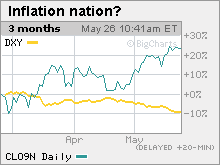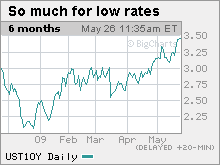Is it really time to whip inflation now?
Some investors are worrying about a return to '70s style inflation as the dollar weakens and oil and gold soar. But the concerns, while valid, are premature.

 |
| With the economy showing signs of recovery, oil prices (CLO9N) have shot up while the dollar (DXY) has fallen against a basket of global currencies. That could be a sign of inflation on the horizon. |
 |
| Even though the Fed has kept its key interest rate near zero since December, long-term bond yields have been steadily rising higher. |
NEW YORK (CNNMoney.com) -- The nation has a 'flation problem. But it is deflation or inflation? Or maybe it's disinflation, stagflation or hyperinflation?
During this nearly year and a half long recession, deflation has been the major worry.
That's when prices are in a persistent state of decline, and the clearest example is in the housing market: home prices have been in free fall for some time. According to a report released Tuesday, prices dropped a record 19% in the first quarter.
But prices of many other assets, including stocks and commodities, have been rising lately. And so-called core consumer prices, which exclude volatile food and energy costs, have inched higher in the past few months.
Still, the overall level of inflation remains well below levels usually evident in normal economic times. That's why some experts believe what we've got is disinflation, a reduction in the level of inflation.
Disinflation is not as bad a problem as deflation. But it still means companies don't have pricing power, which often leads them to cut back production and lay off workers.
At the other end of the spectrum, a growing chorus of economists are starting to fear an ugly return of inflation or even hyperinflation, a period where prices rise so rapidly that money is essentially worthless.
That's a condition that hit Germany hard during the Weimar Republic years between World War I and World War II. Inflation was so problematic that there were stories of people carting around wheelbarrows of money just to buy bread or milk.
Now that level of inflation seems unlikely. But concerns about inflation in general are valid.
Many experts are worried that the massive amount of government stimulus will eventually lead to higher prices because the Federal Reserve will simply print more money to finance various bailouts and programs. Doing so will devalue the dollar.
"What we're likely to see in the near-term are some beginnings of inflation back in the system," said Michael Strauss, chief economist with Commonfund, a money management firm based in Wilton, Conn. "We are worried about the size of the budget deficit."
And even though Strauss said he thinks inflation may be relatively low, he's worried about the possibility of stagflation, where the economy is hurt by both rising prices and sluggish growth, over the next few years.
Talkback: Are you worried about inflation? Leave your comments at the bottom of this story.
Investors are also starting to signal that inflation could be a concern.
The yield on the benchmark U.S. 10-year Treasury has risen from around 2.2% to 3.4% in the past six months. Higher long-term rates are often an indication that bond investors are more worried about inflation.
There are other telltale signs of inflation starting to perk up, too. The dollar has weakened during the past few weeks. Oil prices have shot substantially higher. The prices of other commodities, most notably gold, a classic hedge against inflation, have followed suit.
The inflation fears are being further fueled by the Fed's interest rate policy.
It has kept short-term rates near zero since December, and doesn't want to jeopardize the recovery by boosting rates too soon. Fed vice chairman Donald Kohn said as much in a speech last Saturday.
"The economy is only now beginning to show signs that it might be stabilizing, and the upturn, when it begins, is likely to be gradual," he said, adding that "it probably will be some time" before the Fed raises rates again.
That may spook some who believe that inflation will be an inevitable consequence of keeping rates low for a prolonged period of time.
But even though the stock market has soared since March on hopes that the worst of the recession is over, some economists think it's premature to make that declaration.
Oscar Gonzalez, economist with John Hancock Financial Services in Boston, said the government has to make a recovery the first priority, even if a byproduct of that is inflation.
"Inflation is a worry. But it's not the immediate fear for most consumers. People are more worried about not having a job," he said. "You still have to be more concerned about putting out the fire than the water damage from putting it out."
Along those lines, the job market is still incredibly weak. Companies have continued to cut jobs this year and as a result, hourly wages have risen only slightly during the past few months.
It's hard to have substantial inflation at a time when salaries are not rising dramatically since labor costs tend to be the driving force behind price gains.
With that in mind, there is some evidence to suggest that the fears of imminent inflation are overblown.
Craig Callahan, founder and president of ICON Advisers, a Greenwood Village, Colo.-based mutual fund firm, pointed out in a note to clients Tuesday that inflation pressures have actually eased following the past few recessions.
According to Callahan's research, the average increase in consumer prices in the two years leading up to the past four recessions was 7.2% a year. But in the four-year period following those recessions, consumer prices rose just 3.9% annually.
Of course, there is no guarantee that this pattern will play out again. This recession is substantially different in nature, and more severe, than those of the past few decades.
But Callahan wrote that it makes sense that prices would remain in check following a downturn and could serve to counteract some of the inflationary pressure from fiscal stimulus.
"Perhaps workers become more docile in their wage demands. Perhaps coming out of recession businesses try to regain market share rather than raise prices," Callahan wrote. "Whatever the reason, we believe, based on past recessions, inflation should remain controlled for a few years."
Hopefully he's right and you can keep your wheelbarrow in the garden where it belongs.
Talkback: Are you worried about inflation? ![]()

